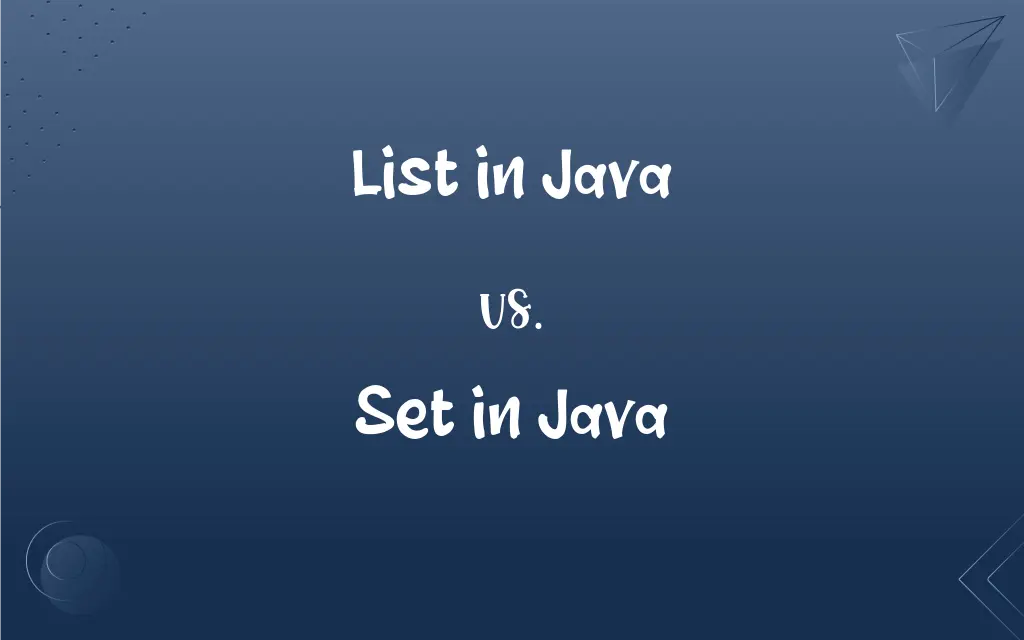List in Java vs. Set in Java: What's the Difference?
Edited by Aimie Carlson || By Harlon Moss || Published on February 26, 2024
In Java, a List maintains insertion order and allows duplicate elements, whereas a Set is a collection that cannot contain duplicate elements and does not guarantee order.

Key Differences
In Java, a List is an ordered collection that can contain duplicate elements and maintains the insertion order. A Set, conversely, is a collection that cannot contain duplicate elements and does not guarantee any specific order of elements.
Lists in Java are typically used when order matters and duplicates are permissible, such as in maintaining a sequence of events. Sets are used when uniqueness of elements is crucial, such as in a collection of distinct items where order is not a concern.
Accessing elements by index in a List is efficient, making it suitable for scenarios with frequent retrieval operations. In a Set, operations like add, remove, and check for existence are generally faster, especially in a HashSet, due to hashing.
The Java List interface has various implementations like ArrayList and LinkedList, each with specific performance characteristics. Set implementations include HashSet, which offers constant time performance for basic operations, and TreeSet, which maintains a sorted order.
Methods in a List interface, such as get(index), are focused on indexed access. In contrast, Set interface methods, like add(element) and contains(element), emphasize uniqueness and do not support direct access by position.
ADVERTISEMENT
Comparison Chart
Duplicates Allowed
Yes
No
Order Preservation
Maintains insertion order
Does not guarantee order
Performance
Efficient indexed access
Faster add, remove, and existence check
Typical Use Cases
Ordered collection, sequence tracking
Uniqueness enforcement, unordered collection
Key Operations
Get, set, add with index
Add, remove, contains
ADVERTISEMENT
Implementation Examples
ArrayList, LinkedList
HashSet, TreeSet
Element Access
Direct access by index
Access via iteration only
Null Element Support
Depends on implementation (usually allowed)
Depends on implementation (varies)
Iterating Behavior
Predictable order
Order can vary
Ideal for
Scenarios where order and duplicates matter
Scenarios requiring unique elements
List in Java and Set in Java Definitions
List in Java
Lists in Java can be dynamically resized.
The ArrayList expanded automatically as more items were added.
Set in Java
Sets in Java do not guarantee the order of elements.
The order of elements in the HashSet was unpredictable.
List in Java
It allows positional access and insertion of elements.
Using the List, the program inserted a new element at the third position.
Set in Java
Some Set implementations like TreeSet maintain a sorted order.
The TreeSet kept the elements in ascending order.
List in Java
Java Lists maintain the insertion order of elements.
The List preserved the order of entered data, which was crucial for the report.
Set in Java
A Set in Java is a collection that cannot contain duplicate elements.
The Set automatically removed duplicate entries from the data.
List in Java
A List in Java is an ordered collection that can contain duplicate elements.
The List stored the names of all participants, including duplicates.
Set in Java
It generally provides faster access than a list for checking the presence of an element.
Searching in the HashSet was faster than in a List.
List in Java
A List can contain multiple null elements if allowed by the implementation.
The LinkedList in the program contained several null values.
Set in Java
Sets are ideal for maintaining unique collections.
To ensure uniqueness, the program stored the IDs in a Set.
FAQs
Can a Java List contain duplicates?
Yes, a Java List can contain duplicate elements.
Does a Set in Java maintain insertion order?
No, most Set implementations in Java do not maintain insertion order.
Can you add an element to a Set in Java using an index?
No, elements in a Set cannot be added or accessed using an index.
Does a TreeSet in Java sort its elements?
Yes, TreeSet in Java maintains its elements in a sorted order.
Is it possible to sort a List in Java?
Yes, a List in Java can be sorted using methods like Collections.sort().
How do you check for an element in a Set in Java?
You can check for the presence of an element in a Set using the contains() method.
What is a List in Java?
A List in Java is an ordered collection that allows duplicate elements and positional access.
What defines a Set in Java?
A Set is a collection in Java that cannot contain duplicate elements and does not guarantee order.
What are common implementations of List in Java?
Common List implementations include ArrayList and LinkedList.
Can a List in Java hold null values?
Yes, most List implementations in Java can hold null values.
What are some Set implementations in Java?
HashSet and TreeSet are popular Set implementations in Java.
How does indexed access work in a List in Java?
In a List, elements can be accessed and modified by their index position.
Are null values allowed in a Set in Java?
It depends on the specific implementation of the Set.
What happens if you try to add a duplicate element to a Set in Java?
The Set ignores the addition of duplicate elements.
How do you remove an element from a List in Java?
Elements can be removed from a List using the remove(index) or remove(object) methods.
How do you retrieve elements from a List in Java?
Elements in a List can be retrieved using the get(index) method.
Can you have an ordered Set in Java?
Yes, TreeSet is an example of an ordered Set in Java.
What is the main difference between ArrayList and HashSet in Java?
ArrayList maintains order and allows duplicates, whereas HashSet does not maintain order and does not allow duplicates.
Is iteration order predictable in a List in Java?
Yes, the iteration order in a List is predictable and follows the insertion order.
Which is faster for searching, List or Set in Java?
Typically, a Set is faster for searching than a List.
About Author
Written by
Harlon MossHarlon is a seasoned quality moderator and accomplished content writer for Difference Wiki. An alumnus of the prestigious University of California, he earned his degree in Computer Science. Leveraging his academic background, Harlon brings a meticulous and informed perspective to his work, ensuring content accuracy and excellence.
Edited by
Aimie CarlsonAimie Carlson, holding a master's degree in English literature, is a fervent English language enthusiast. She lends her writing talents to Difference Wiki, a prominent website that specializes in comparisons, offering readers insightful analyses that both captivate and inform.






































































